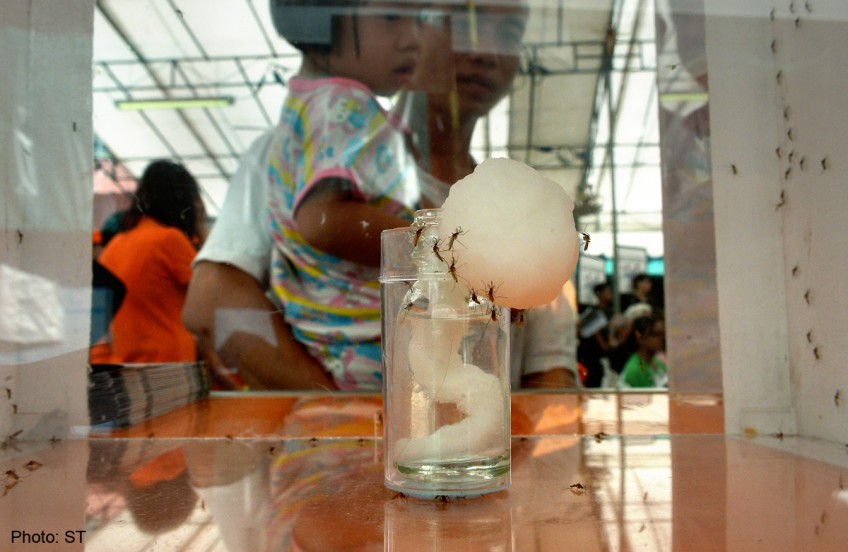80 per cent increase in mozzie breeding spots, warns NEA

THE number of dengue cases reported in the first three months of this year may have gone down by more than a third compared to last year, but residents have been urged to keep their guard up.
This is because the number of Aedes mosquito breeding spots in homes increased by 80 per cent last month compared to the month before, according to the National Environment Agency (NEA).
The increase in Aedes mosquitoes due to more breeding habitats could lead to a surge in dengue cases as the traditional dengue peak season approaches, said Second Minister for the Environment and Water Resources Grace Fu yesterday.
Speaking at the main launch event of the "Do the Mozzie Wipeout" campaign at the Bukit Gombak Neighbourhood Centre, she stressed the importance of focusing on dengue prevention as the warm weather months draw near.
"We need every household to be vigilant and not to let their guard down because the environment at home will have a direct impact on our families," she said.
According to NEA, there were 2,159 reported cases of dengue from January to March this year - 39 per cent lower than the 3,557 cases seen during the same period last year.
The warmer months of June to October see the traditional peak season for dengue, due to faster breeding and maturation cycles for the Aedes mosquitoes, as well as short incubation periods for the dengue virus.
Last year, there were 17,600 dengue cases and five deaths. In 2013, dengue hit a record 22,170 people and caused seven deaths.
NEA conducted more than 3.5 million inspections and destroyed more than 18,400 mosquito breeding habitats, most of which were found in homes last year.
The breeding sites found in homes included containers, flower pot plates and trays.
At yesterday's event, Ms Fu and South West District Mayor Low Yen Ling went around eateries and residential units in Bukit Gombak to promote practices such as turning over water containers and covering bamboo poles when not in use.
The campaign was also launched at four other regions islandwide to raise awareness on dengue prevention.
Separately, Ms Fu said stakeholders such as nature groups will be consulted on the use of Wolbachia-carrying male Aedes mosquitoes to bring down the Aedes mosquito population.
When Wolbachia-carrying male Aedes aegypti mosquitoes mate with female Aedes aegypti mosquitoes, the latter produce eggs that do not hatch.
The agency had earlier called for a tender seeking proposals to study the possible side effects of using this biological method.
The tender closed on Thursday, and the study will take up to eight months from the award of the contract.
Bukit Gombak resident Wo Ah Hay, who attended the launch event yesterday, said that she always makes an effort to ensure that there is no stagnant water near her flower pots.
Said the 74-year-old retiree: "How can you not be afraid of dengue? There is no cure for it."
kcarolyn@sph.com.sg

Get MyPaper for more stories.